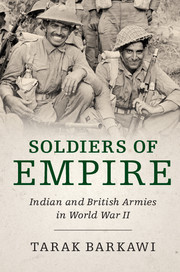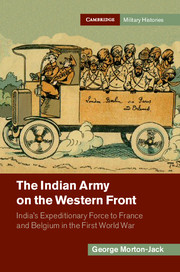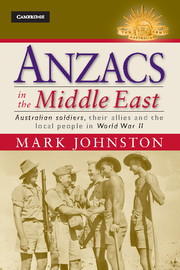Soldiers of Empire
Indian and British Armies in World War II
£68.00
- Author: Tarak Barkawi, London School of Economics and Political Science
- Date Published: June 2017
- availability: Available
- format: Hardback
- isbn: 9781107169586
£
68.00
Hardback
Other available formats:
Paperback, eBook
Looking for an inspection copy?
This title is not currently available on inspection
-
How are soldiers made? Why do they fight? Re-imagining the study of armed forces and society, Barkawi examines the imperial and multinational armies that fought in Asia in the Second World War, especially the British Indian army in the Burma campaign. Going beyond conventional narratives, Barkawi studies soldiers in transnational context, from recruitment and training to combat and memory. Drawing on history, sociology and anthropology, the book critiques the 'Western way of war' from a postcolonial perspective. Barkawi reconceives soldiers as cosmopolitan, their battles irreducible to the national histories that monopolise them. This book will appeal to those interested in the Second World War, armed forces and the British Empire, and students and scholars of military sociology and history, South Asian studies and international relations.
Read more- Engagingly written, it appeals to a wide-reaching audience across multiple disciplines and beyond those interested only in military subjects
- Puts the study of soldiers and battle at the centre of the contemporary humanities and social sciences
- An approach to military history and sociology that makes the colonial and imperial central to the study of war
Awards
- Co-winner, 2019 Francesco Guicciardini Prize for Best Book in Historical International Relations, International Studies Association
Reviews & endorsements
'It is sociological military history of the highest quality.' Christopher Dandeker, King's College London
See more reviews'Only very rarely does a book come along which rips up the existing foundations of our thought and forces us to rethink the pigeon holes into which we put it. This is such a book. If you have been perplexed as to why Sikhs became the bedrock of the British Indian Amy but have not joined today's British Army in the same numbers, Tarak Barkawi gives you the answer. The implications, however, range far beyond his declared subject matter, challenging not just how we conceptualise armies and the ways in which they fight, but also how we configure the battles in which they kill and are killed.' Sir Hew Strachan, military historian
'How does an army succeed in beating a tough enemy, overcoming its own racial, caste and linguistic hierarchies and divisions? Tarak Barkawi's fascinating book on the Indian Army in World War II draws important lessons for those interested in the causes of imperial control and military effectiveness.' Steven Wilkinson, Yale University, Connecticut
'Both the scholarship and popular wisdom about modern armies links their loyalty, courage and sacrifice to shared identities, whether national, racial or ethnic. In this superb study of the multi-racial, multi-lingual and multi-religious British Indian army during the Second World War, Tarak Barkawi demonstrates how this simplistic view can only be sustained by consigning imperial and other diverse or non-national forces to backward peoples and non-modern pasts. He points out that far from being historical curiosities, such cosmopolitan armies have increasingly come to characterise warfare all over the world, with the Indian army itself transformed from an old-fashioned colonial force to a global one in the 1940s. Using imperial history to question the Western obsession with citizen-armies, themselves more myth than reality, Barkawi allows us to understand the changing nature of military cohesion in fresh new ways.' Faisal Devji, University of Oxford
'Tarak Barkawi brings his unusual insight to the timeless question of how soldiers are made and why they fight. In challenging much of the received wisdom about the relationship between the armed forces and society, this original and richly documented account of British Indian and British imperial forces underscores the value of bringing a postcolonial perspective to the study of the military. This path-breaking book will be of interest to historians, political scientists and sociologists. It is likely to become a classic in the field.' Elizabeth Kier, University of Washington
'Soldiers of Empire is a wonderful book: beautifully written, expertly crafted and mixing high theory with historical detail in a way that is as rare as it is illuminating. All contributors to this forum agree that it is a work of immense scholarship, one that occupies an innovative space at the interstices of military history, historical sociology and post-colonial theory.' George Lawson, International Affairs
'… Barkawi challenges understandings of soldiers and armies in all contexts, demonstrates the colonial underpinnings of military historiography (and their incorporation in contemporary scholarship), and establishes the central role of empire in shaping the military forces of both the past and today. As such, this book should be essential reading for scholars of military history, (critical) war studies, and global and postcolonial international relations at all levels.' Emil Archambault, International Studies Review
Customer reviews
Not yet reviewed
Be the first to review
Review was not posted due to profanity
×Product details
- Date Published: June 2017
- format: Hardback
- isbn: 9781107169586
- length: 338 pages
- dimensions: 235 x 158 x 22 mm
- weight: 0.6kg
- availability: Available
Table of Contents
Introduction. Decolonising the soldier
Part I. Colonial Soldiers:
1. Making colonial soldiers in British India
2. Unmaking an imperial army
3. Politics and prisoners in the Indian army
Part II. Going to War:
4. Defeat, drill and discipline
5. Ritual, solidarity and sacrifice
6. Battle
Part III. History and Theory:
7. The experience and representation of combat
8. Cosmopolitan military histories and sociologies.
An Interview with Tarak Barkawi
Sorry, this resource is locked
Please register or sign in to request access. If you are having problems accessing these resources please email lecturers@cambridge.org
Register Sign in» Proceed
You are now leaving the Cambridge University Press website. Your eBook purchase and download will be completed by our partner www.ebooks.com. Please see the permission section of the www.ebooks.com catalogue page for details of the print & copy limits on our eBooks.
Continue ×Are you sure you want to delete your account?
This cannot be undone.
Thank you for your feedback which will help us improve our service.
If you requested a response, we will make sure to get back to you shortly.
×




